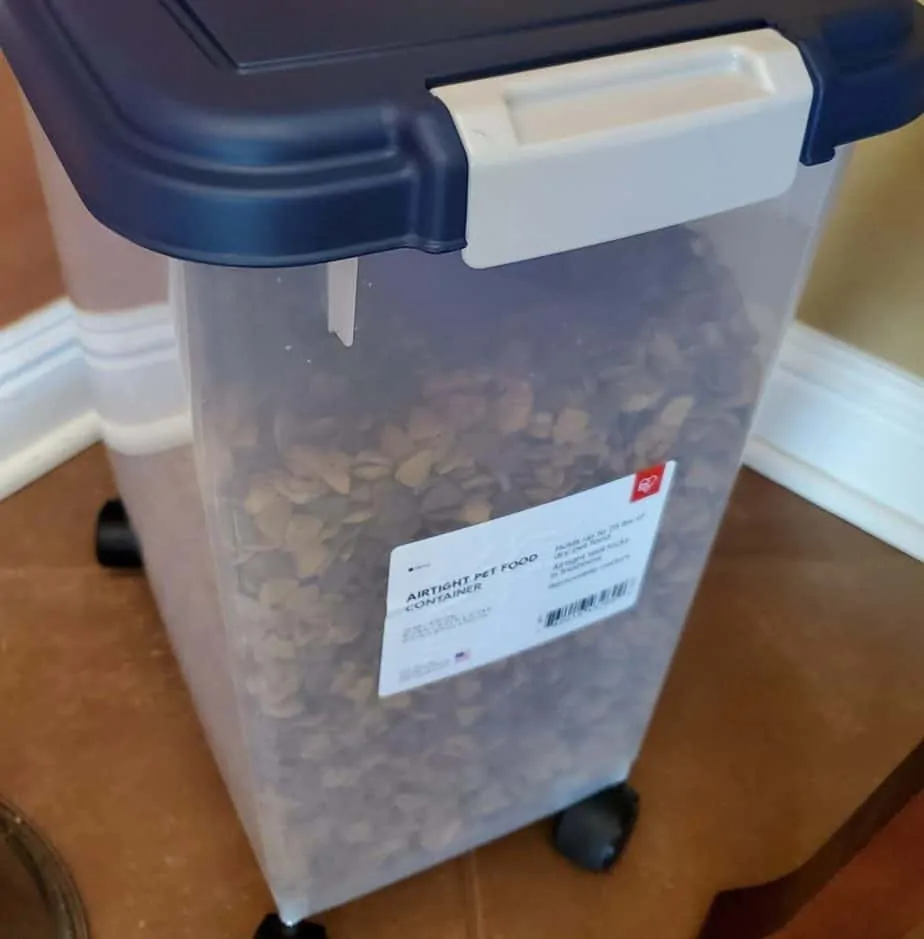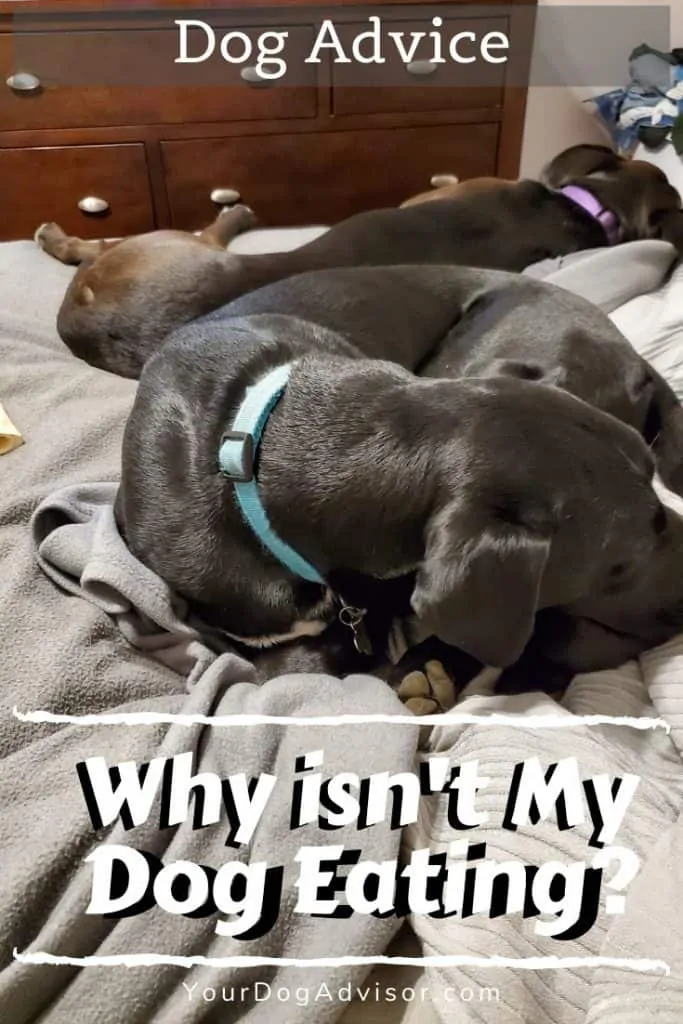An everyday thing that pet owners are used to is their dog eating regularly. A great appetite, as well as a balanced diet is always important to your dogs health. When your dog doesn’t eat over a period of time, owners often become concerned.
Here are a handful of reasons why your dog may not be eating, and how to overcome some things to help your dog get back on their eating ways.
Contents
How much should my dog eat?
We should start by analyzing the question that sometimes isn’t always the easiest to answer: Just how much food should my dog be eating? Many will believe whatever the back of their dog foods bag says, while others just guesstimate depending on how much their dog eats normally.
Research states the following: For dogs less than 50 pounds, they should be fed close to 3 cups of food per day. For dogs that weigh 50-70 pounds, they should be fed approximately 3.5 cups a day. 3 1/2 cups per day if they weigh 70 pounds. 80-90 pound dogs should be fed 3.5-4 cups per day, while dogs bigger than this, a full 4 cups a day.
Age still makes a difference, and puppies under the age of one should still be fed puppy food and may not eat more than two cups a day.
While these are recommendations, you still should judge based on what your vet recommends as well. For my 50 pound dog, she usually eats just 2 ¼ cups of food a day, while my 80 pound dog eats three cups of food a day, which fills them both up.

Reasons your dog isn’t eating
Sick/Illness
When your dog doesn’t feel well, most likely, they are not going to want to eat. If your dog has diarrhea, vomits or spits up, you may want to begin to keep an eye out. If they continue to not eat after one day, take your dog to the vet immediately.
Some dogs do not have a huge appetite every day, thus do not panic if they barely eat for one day.
Some ideas to ease their possible stomach illnesses may include:
- Wet your dog’s food to make it more appetizing
- Get dog food for sensitive stomachs
- Hand feed your dog to make it simpler until they feel better
- Rub their belly to ease their anxiety- Oftentimes, when my dogs are stressed out, a good rub of the belly can really calm their minds and bodies.
Depression and Social Issues
Dogs can quickly become depressed. Whether it’s because they are lonely, their parents are never home, or they are ignored, depression can cause them to not eat. Other reasons for depression and social issues include:
- Parents breakup or change in household: When a couple breaks up, or another family member leaves for any reason, your dog might have no appetite.
- Other animal passes: Unfortunately, dogs and cats die for a variety of reasons. When your second dog notices their brother or sister is gone, depression will most likely kick in. Along with this, lack of appetite will most likely appear.
- Moving to a new location: If your dog moves to a new home, or is adopted/fostered into a new home, lack of appetite may be present at first.
Portioning out dogs food may help them eat better
Picky times to eat
If you have a dog like mine, they may just eat at random times. Some days, she eats a regular breakfast and dinner with her dog brother, while other times, she gets picky and may eat later during the day.
A few other things to keep an eye out for when it comes to dogs not eating are:
-
- Do they like their food?: While this seems it would be obvious if they have been eating it for a while, doing your observing and research may be crucial. They may not really enjoy their food, and the change of food may be necessary if they are constantly upset with their food.
- Change of recipe: Food recipes change. WHile you may have fed your dog their food for years, companies change the recipe, and next thing you know, it upsets your dog.
- Stale food: Buying a large bag of food for a smaller dog may not be the best idea, as they do not eat as much. When the bottom of the bad sits too long, it may become stale, causing your dog to be nauseous. Making sure your dog’s food is up to date is very important.
- Amount of food: We have all been guilty of it. You grab a cup of food for your dog, drop it into their bowl, only to realize there was still food leftover in the bowl. The amount of food is way too much for your dog, and they are smart enough to realize it. Sometimes, they can be overwhelmed with the amount of food in the bowel, and will walk away without touching it.
- They are picky: Plain and simple, they may just eat when they want, and however much they feel like, while not caring what you think. A lot of dogs will suddenly only eat a few bites of food, then not come back to it for hours. Our one older dog does this all the time now, eating small amounts, then coming back for the rest later when she feels like it.
- They have allergies: Just like humans, dogs can have allergies too. The possibility that your dog is allergic to a certain ingredient or type of food has to be considered and analyzed.

Vaccinations or medications
Some medications and vaccinations can cause temporary loss of appetite in dogs. While these medications and vaccinations are meant to help, dogs stomachs do not always agree.
Vaccinations often cause a brief inflammation within your dog’s body, which can throw them off for a bit. If you dog is hesitant to eat the day of a vaccination, it is nothing to be too concerned about. Along with this, medications, much like in humans, do have side effects from time to time. Making sure you check with your vet before continuing a medication is highly recommended.
Things to try
When you are concerned about your dog’s eating habits, there are a few tricks and ideas to try:
- Cut out treats: People love to feed their dogs treats. When your dog eats multiple treats, it may cause them to eat less and have no appetite.
- Be consistent, routined: Just like humans, dogs get into a routine as well. Making sure you are consistent with their two feedings a day at similar times will be crucial in your dog being ready to eat.
- Exercise your dog before: Right before meals, try and walk your dog or exercise them. This will get them sweating and might make them eat their whole meals.
- Try a different bowl or eating area: Possibly the bowl you have given them, or the anxiety of eating by another animal/area is causing your dog to be hesitant to eat. Switching up the bowl or area may put them in a more comfortable situation.
Too many treats can cause loss of appetite in dogs
When to call for help
At some point, you have to be concerned about your dog’s eating habits. Believe it or not, if your dog does not eat for a day or day in a half, it most likely is nothing to always be worried about.
Many dogs do not eat everyday. However, if this is the case, and there is vomiting or diarrhea, it is advised to call your vet immediately.
If you see a consistent pattern that concerns you, have the vet check your dog out to make sure nothing serious is going on with them.
What are some other thoughts/ideas you think about when your dog doesn’t eat? Please feel free to comment below.

Jen Jones is a professional dog trainer and behavior specialist with more than 25 years of experience. As the founder of ‘Your Dog Advisor’ and the ‘Canine Connection’ rehabilitation center, she applies a holistic, empathetic approach, aiming to address root causes rather than merely treating symptoms.
Well known for her intuitive and compassionate approach, Jen adopts scientifically-proven, reward-based methods, encouraging positive reinforcement over punishment. Jen specializes in obedience training, behavior modification, and puppy socialization. Her innovative methods, particularly in addressing anxiety and aggression issues, have been widely recognized. Jen has worked with many of the world’s leading dog behaviorists and in her free time volunteers with local animal shelters and rescue groups.


